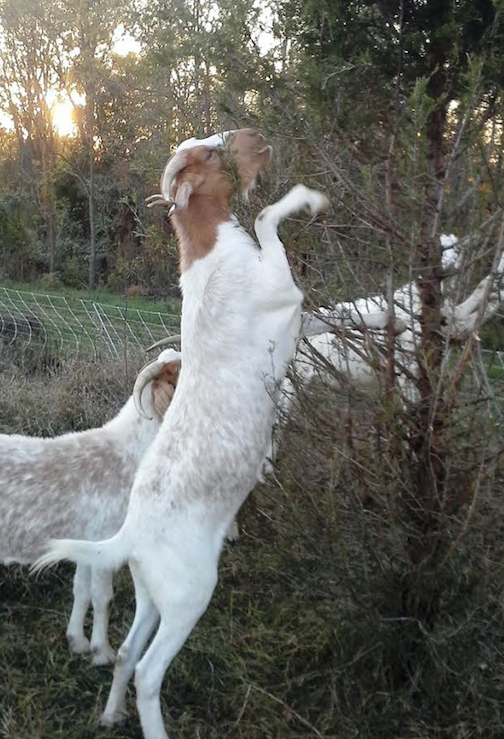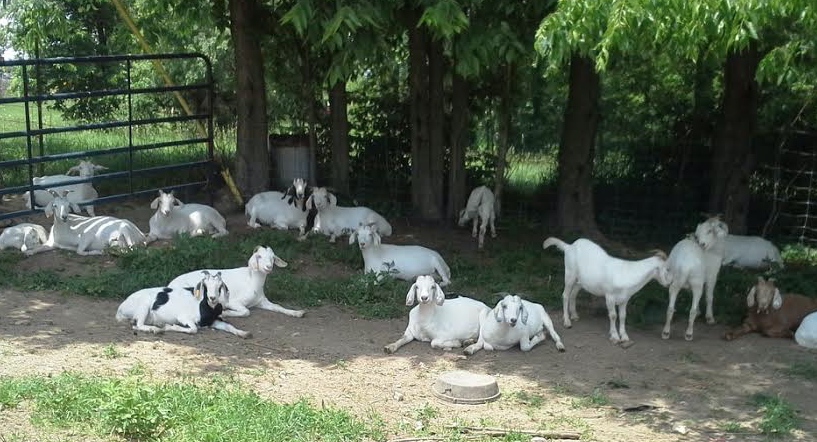By Mary Jo Harrod
Special to NKyTribune
Goats!
Goats turned out to be the answer for David Neville, owner of Capstone Farms of Henry County. Neville is a producer of Angus and Angus Cross cattle and didn’t want to use pesticides on his land, but he needed a solution to the problem of brush control. After careful thought and research, Neville decided to use 52 Kiko/Savannah cross goats for browsing brush control. Goats eat woody materials, some of which are harmful to cattle. Spraying chemicals to control toxic plants is expensive and harmful to the environment.
“Wild cherry is a nemesis to farmers,” said Neville. “A mouthful of a wild cherry plant that is wilted will kill a large cow. Goats eat the plant when it’s fresh. Since goats eat these and other toxic and invasive plants, the need for pesticides is eliminated.”

Goats enjoying munching on bush honeysuckle, poison ivy, poison oak, wild rosebushes and kudzu, all plants that farmers try to remove from their land (Photo Provided)
Despite the myth that goats will eat anything, they are selective about their dining choices and consume their favorite foods first. Luckily, goats enjoying munching on bush honeysuckle, poison ivy, poison oak, wild rosebushes and kudzu, all plants that farmers try to remove from their land.
Neville said when the goats begin to eat small cedar trees, their least favorite food, he knows they have eaten the toxic and invasive plants and will be ready to move to another field in two days.
Neville went organic with Capstone Farms, which consist of 258 acres of grassland, by accident. He did soil testing to see what the land needed for cattle. He thought about the environmental and financial cost of pesticides to use around fence rows and decided there must be a better way. That’s when he decided to try goats in his fields. Tricksie, his Pyrenees/Anatolian Shepherd dog protects the goats and calves from coyotes, hawks, stray dogs and other predators.
After three years of using no pesticides, Neville’s farms have been certified organic.
Besides raising beef and meat goats and growing organic hay in Henry and Shelby counties, Neville and his Capstone Produce Market offer for sale fresh fruits and vegetables, meat, lumber, firewood, hay, straw and other local products from area growers. He is aware of the importance of providing organic and local products to consumers and concentrates marketing to commercial and institutional buyers in Louisville, Lexington and northern Kentucky. He’s been contacted by a public school system, praising the beef from his cattle, saying it is different and better.
“We sold beef to the University of Kentucky system,” Neville said. “With a total of six steers that were graded after harvest, five of the six graded choice to high choice, and one graded prime.”

At another farm located in Campbellsburg, Neville is doing a three-year project to demonstrate what goats will actually consume. He’s working with the University of Kentucky Extension, Kentucky State University Small Ruminant Specialists and GIS Specialists (site map and drone evaluation), Kentucky Department of Agriculture, Kentucky Forestry and other experts in invasive species control.
One of the challenges Neville has faced with his project of using goats instead of pesticides is getting other people to understand what he’s trying to accomplish. He also uses specialized, electric fencing to keep the goats in and predators out of the fields. The labor required is more intensive since he moves the goats periodically from field to field.
Neville knows he has saved money and helped the environment of his farms by using goats instead of chemicals. Besides those benefits, the goats provide free organic fertilizer. Due to the successful experiences using goats on his farms, he has made some of his goats available for lease to clear up invasive species on other properties.
For others who are thinking about going organic on their farms, Neville suggested, “Do your homework and then make sure you can profitably market your products.”
Mary Jo Harrod is public information officer for the Energy and Environment Cabinet, Division of Compliance Assistance.
















